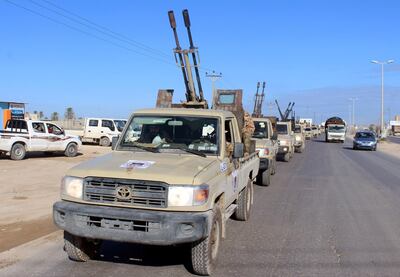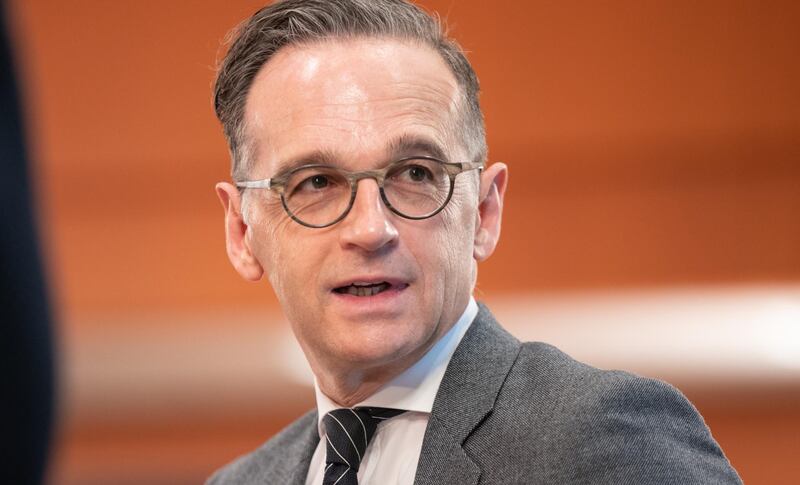The UK, Germany and France have pressed for a ceasefire in Libya in discussions with Turkey after Ankara’s intervention there.
In virtual meetings, foreign ministers from the four nations discussed the developing situation in Libya, the coronavirus outbreak and arrangements for the return of European tourists to Turkey, the German Foreign Ministry said.
“We observe with great concern that the call for a humanitarian ceasefire, particularly now in the month of Ramadan, has remained largely ineffective,” the ministry said.
“Instead, we are still in an escalation spiral with ongoing fighting and further arms deliveries.”
In the past month, forces aligned with the Government of National Accord in the Libyan capital, Tripoli, have achieved military victories in the west of the country, bolstered by militias sent from Syria by Ankara and Turkish air and logistical support.
On Monday the Libyan National Army, led by Field Marshal Khalifa Haftar, gave up control of the strategic Al Watiya airbase, a position the eastern-aligned forces had held since 2014.
European nations have sought to de-escalate violence in Libya by enforcing the country’s long-flouted arms embargo.
A re-commitment to stopping the movement of arms to the country was one of the key developments from the Berlin conference on Libya early this year.
In March, the EU launched Operation Irini, its naval mission in the Mediterranean to enforce the arms embargo with monitoring by satellite, in the air and at sea.
“With the EU Operation Irini, we will also do our part to implement the arms embargo. We also talked to Turkey about this today,” the German ministry said.
Fadi Hakura, a consulting fellow on Chatham House's Europe programme, told The National that with its focus on the coronavirus outbreak, Europe only had a limited interest in Libya.
“At the moment Europe doesn't really care or is not really that concerned about external interventions in Libya,” Mr Hakura said.
“Turkey's ability to exploit that lack of focus” would be constrained, however, “by the domestic, economic and financial circumstances” in the country.
Mr Hakura said that Turkey’s ambition in Libya was partly economic but also motivated by psychological and ideological factors.
“Turkey wants to exploit any natural resources in the Mediterranean Sea, particularly gas reserves,” he said.
“Also, partly it is psychological in that Turkey has felt left out by some of its adversaries in the region, particularly Egypt, Cyprus and Greece.
"Turkey wants to reassert and wants to show that it cannot be ignored.”

Relations between Ankara, Brussels and EU nations such as Greece and Cyprus have become tense over disputes regarding natural gas deposits near Cyprus.
Turkey and its state oil companies have been accused of exploiting the decades-old dispute over Cyprus to ignore international law.
Turkey does not recognise Cyprus as a state and claims the north of the island as part of its own economic zone.
The longstanding disagreement over the eastern Mediterranean has increasingly intersected with the conflict in Libya, especially since November when the GNA and Turkey confirmed a maritime border deal in exchange for military co-operation.
The agreements, although not internationally recognised, would give Turkey access to lucrative natural gas reserves in the area.
Britain, France, Germany and Turkey also opened discussions into the prospect of tourists returning to Turkey after the pandemic.
“We hope that Turkey can soon become a destination for German and European tourists again," the German mministry said.
"However, we have to evaluate this in due course and according to strict health criteria.
Mr Hakura said Ankara was desperate for the return of tourists to help solve many its financial woes.
“Turkey is unlikely to benefit from the summer tourist season that brought in close to $35 billion [Dh128.56bn, last year] that Turkey critically needs at the moment,” he said.
“Turkey really wants these German, Italian, UK and other European tourists and Russian tourists to visit the country so they can salvage some of the dollar inflows the economy really needs."







